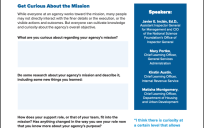 Do you have an inquiring mind? In my article on effective communication skills for leaders, I suggested that we balance advocacy with inquiry. In fact, asking questions with a sincere intent can make our advocacy even more powerful.
Do you have an inquiring mind? In my article on effective communication skills for leaders, I suggested that we balance advocacy with inquiry. In fact, asking questions with a sincere intent can make our advocacy even more powerful.
But, it doesn’t surprise me that we often leave this important tool lying in our toolbox. We can be passionate about an idea or position but at the same time fear it could be naysayed. So we push forward full steam ahead, like a bull in a china shop. Instead of this, however, balancing advocacy of our ideas with intentional inquisitiveness can produce tremendous gains, as I explain further here.
“Only the inquiring mind solves problems.”- Edward Hodnett
First, no one person knows everything. And, sometimes even the most thorough research won’t disclose all of the potential concerns, nuances and obstacles. So, asking questions might uncover information that buttresses your original position or moves you in a different direction. That’s why lawyers spend so much time asking questions through interrogatories and depositions before going to trial.
“It is error only and not truth, that shrinks away from inquiry.” – Thomas Paine
While it isn’t human nature to seek evidence that could prove you wrong, that’s exactly what you should do. That’s because asking questions will better prepare you for opposition. It will also increase your credibility with others when you have thought about their concerns. But, if you’re reluctant to go to an opposing party with your questions, present your ideas to a friendly audience first. Allow them to play “devil’s advocate” and test out your questions there.
“Appreciative inquiry is a journey of discovery.” – Samuel Mahaffy
Asking questions, when you’re truly asking and not interrogating or seeking to intimidate, can help build relationships. When done at the right time and with the right tone, asking questions shows the other party that you respect their concerns and value their input. And ultimately, it is relationship building that makes our advocacy most successful.
“Progress is born of doubt and inquiry.” – Robert G. Ingersoll
Asking questions reduces misunderstandings and promotes effective dialogue. Sometimes when there are differences of opinions both sides become so entrenched in their positions that the divide between them appears wider than it is. And, if the heels are dug in and you’re not inquiring why, that divide can grow even wider.
But, consider the impact of asking a few simple questions. “What concerns you the most about the proposal?” “How can we address your concerns and move forward collaboratively?” Doing so can promote fuller discussion, especially where all dialogue has ceased. Of course, it will be for naught if you’re not going to listen or are unwilling to compromise.
“It is a shameful thing to be weary of inquiry when excellence is what we seek.” – Marcus Tullius Cicero
If you have a willingness to compromise, asking questions can help you address concerns and negotiate collaborative agreements. I don’t know about you, but I would rather have my good ideas tweaked to address concerns to get everyone on board, than have the proposition fail altogether because I can’t garner support. Ultimately, asking questions to address concerns can produce positive results for all sides.
“Thirst was made for water and inquiry for truth.”- C.S. Lewis
I once read that unasked questions are a trap door waiting to open under your feet. So, the next time you have a good idea, balance your advocacy with intentional inquisitiveness for better results.
Interested in becoming a Featured Contributor? Email topics you’re interested in covering for GovLoop to [email protected]. And to read more from our Winter 2021 Cohort, here is a full list of every Featured Contributor during this cohort.
Shirley A. Jones, Esq. is a Senior Executive Service (SES) member in the federal government and a certified leadership and diversity and inclusion trainer. Considering herself an employee advocate and a career development trainer, she was recently elected National President of Blacks In Government (BIG). Ms. Jones has had the opportunity to testify before Congress on the lack of diversity in the SES and frequently speaks at events in the Washington, D.C., area. She often addresses a variety of topics related to leadership and empowerment. Ms. Jones has also written Op-Ed pieces for the historic AFRO newspaper, HBCU Connect and other publications.





Leave a Reply
You must be logged in to post a comment.